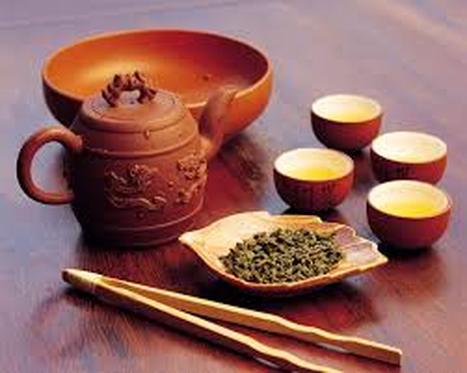<< PREVIOUS SECTION < PREVIOUS PAGE NEXT PAGE > NEXT SECTION >>

Many centuries after tea’s discovery, a famous Chinese tea expert named Lu Yu wrote an important treatise entitled Cha Ching, or The Tea Classic. In this timeless work of literature, Lu Yu set down a series of guidelines for enjoying tea with friends in a dignified, harmonious and richly creative atmosphere. Later, during the Chinese Tang Dynasty (618-906 CE), Japanese Buddhist monks traveled to China to study the philosophical aspects of the Chinese tea ceremony and took this knowledge back to Japan. This knowledge was strongly influenced by Lu Yu’s The Tea Classic.
Zen Buddhism found a receptive home in Japan, and the tea ceremony, called Chanoyu in Japanese, became central to the philosophy and creative energies of Japan’s Zen Renaissance. The principles on which the Japanese tea ceremony is based—humility, simplicity, subtlety and quiet elegance in harmony with nature-- by some quirk of history, also form the foundation of the famous British afternoon tea ritual.
However, Europeans knew nothing about tea until the Sixteenth Century when Portuguese missionaries and traders brought samples back from Asia. Shortly thereafter, the Dutch started shipping Chinese tea to Europe from Java. But it was Catherine of Braganza, wife of England’s King Charles II, who introduced tea to the British people. When she traveled to England in 1662 from her native Portugal to marry Charles, she was already a tea lover. The English people were tired of forty years of Puritan rule and eager for social events and entertainment, and tea parties became popular. But because tea was heavily taxed in England, drinking tea as a social and aesthetic activity could only be enjoyed by the aristocracy. Sadly, the high prices of the coveted tea from far away China led to piracy and other illegal activities, and eventually the excessive tea taxes were rescinded.
By the Victorian Age (1837-1901,) tea was affordable to everyone in the British Empire. Queen Victoria adored her afternoon tea, and all of her subjects throughout the globe followed her example. The custom of enjoying a pot of tea with friends and family while sharing some lovely little snacks became part of the British way of life. A set of dignified guidelines came to surround this activity, and it took on the qualities of an elegant social ritual. This ritual, with its decorum and attention to artistic detail, contributed to the British sense of civilized behavior in much the same way that the Japanese tea ceremony set a standard of dignified excellence for its practitioners.
The British afternoon tea ritual and the Japanese tea ceremony are still alive today in many forms. Fortunately, the ordinary tea lover from Canada to India and every place in between can enjoy this lovely custom. The basic components of afternoon tea: harmony, humility, respect and creativity are available to everyone. If you are saddened and exhausted by the barbaric behavior that surrounds us in our culture today—from the violent and disrespectful conduct at sporting events and in the entertainment industry, to the self-serving actions of our politicians, to the general lack of simple courtesy in daily life—we invite you to join us on the Road Back to Civilization. You are invited to Afternoon Tea.
Zen Buddhism found a receptive home in Japan, and the tea ceremony, called Chanoyu in Japanese, became central to the philosophy and creative energies of Japan’s Zen Renaissance. The principles on which the Japanese tea ceremony is based—humility, simplicity, subtlety and quiet elegance in harmony with nature-- by some quirk of history, also form the foundation of the famous British afternoon tea ritual.
However, Europeans knew nothing about tea until the Sixteenth Century when Portuguese missionaries and traders brought samples back from Asia. Shortly thereafter, the Dutch started shipping Chinese tea to Europe from Java. But it was Catherine of Braganza, wife of England’s King Charles II, who introduced tea to the British people. When she traveled to England in 1662 from her native Portugal to marry Charles, she was already a tea lover. The English people were tired of forty years of Puritan rule and eager for social events and entertainment, and tea parties became popular. But because tea was heavily taxed in England, drinking tea as a social and aesthetic activity could only be enjoyed by the aristocracy. Sadly, the high prices of the coveted tea from far away China led to piracy and other illegal activities, and eventually the excessive tea taxes were rescinded.
By the Victorian Age (1837-1901,) tea was affordable to everyone in the British Empire. Queen Victoria adored her afternoon tea, and all of her subjects throughout the globe followed her example. The custom of enjoying a pot of tea with friends and family while sharing some lovely little snacks became part of the British way of life. A set of dignified guidelines came to surround this activity, and it took on the qualities of an elegant social ritual. This ritual, with its decorum and attention to artistic detail, contributed to the British sense of civilized behavior in much the same way that the Japanese tea ceremony set a standard of dignified excellence for its practitioners.
The British afternoon tea ritual and the Japanese tea ceremony are still alive today in many forms. Fortunately, the ordinary tea lover from Canada to India and every place in between can enjoy this lovely custom. The basic components of afternoon tea: harmony, humility, respect and creativity are available to everyone. If you are saddened and exhausted by the barbaric behavior that surrounds us in our culture today—from the violent and disrespectful conduct at sporting events and in the entertainment industry, to the self-serving actions of our politicians, to the general lack of simple courtesy in daily life—we invite you to join us on the Road Back to Civilization. You are invited to Afternoon Tea.
